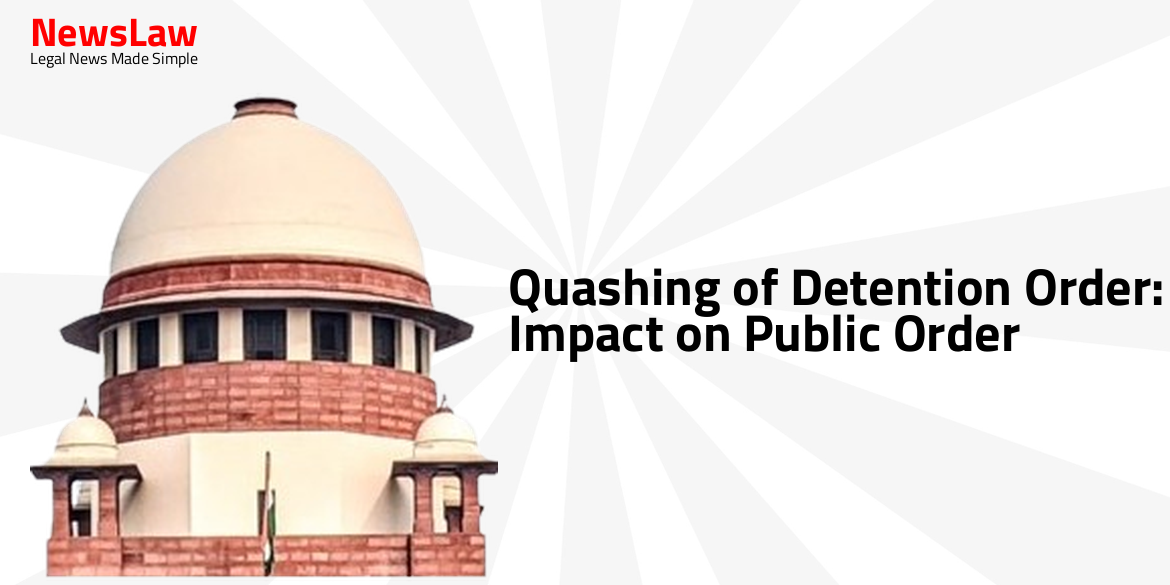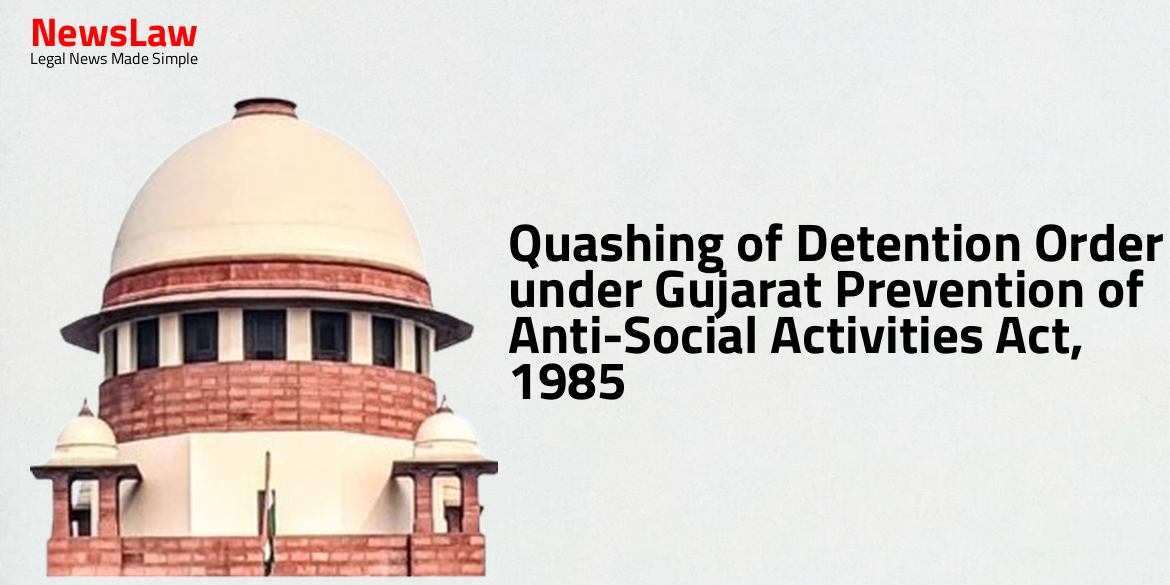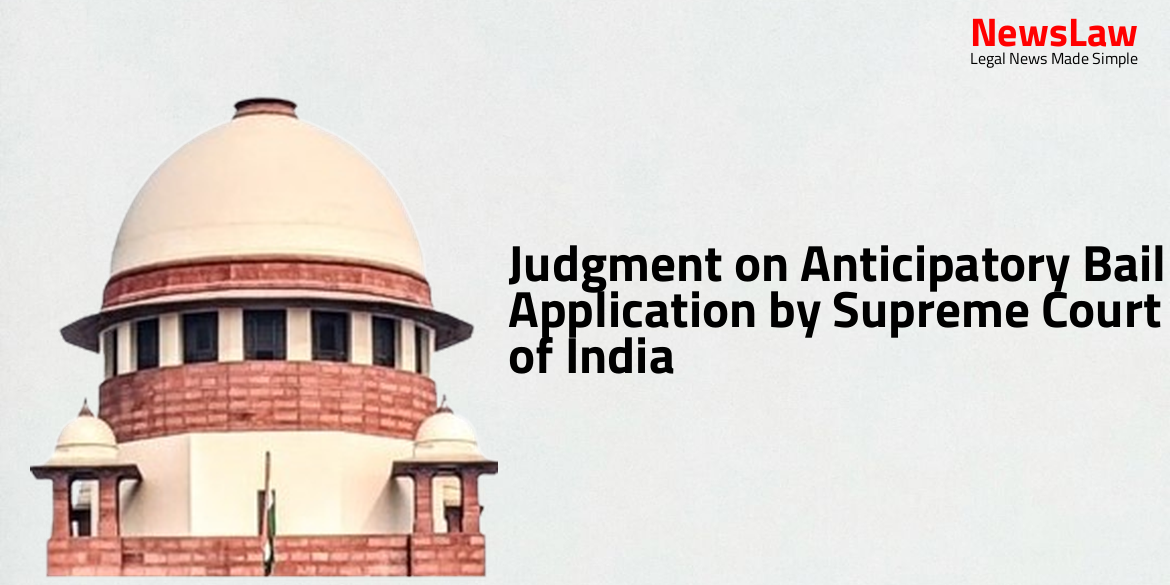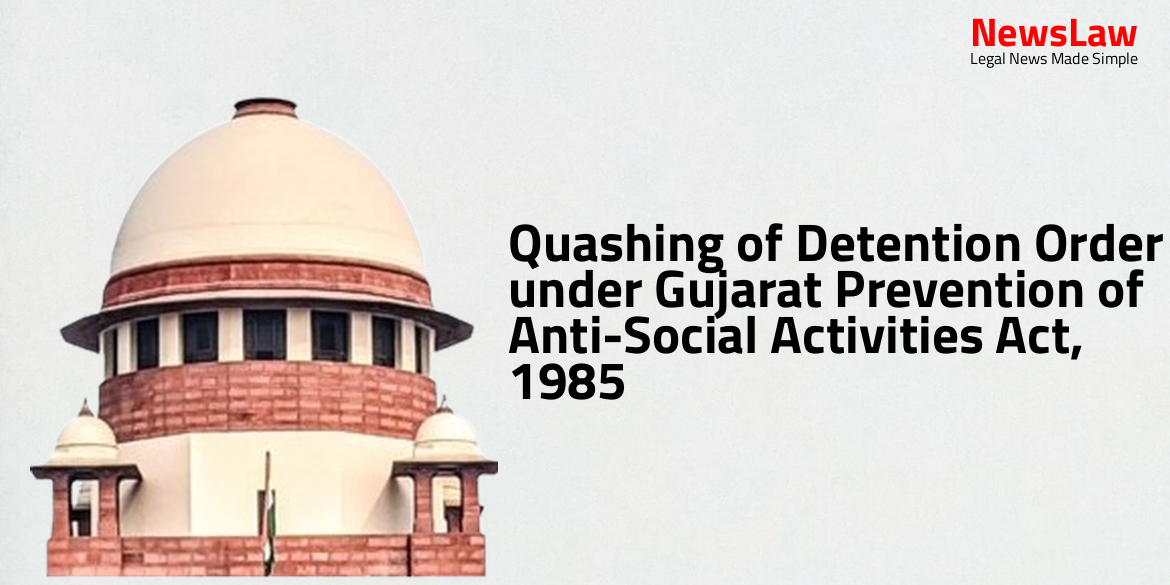In a significant legal development, the Gujarat High Court has quashed a detention order in a case concerning the impact on public order. The court’s ruling, based on the lack of substantial evidence linking the detenue’s activities to public disorder, underscores the importance of differentiating between law and order issues and those affecting public order. This judgment has far-reaching implications for preventive detention cases involving alleged threats to public order in the region.
Issue
- Issue at hand is the sustainability of the detention order passed by the Detaining Authority under the Act of 1985.
- Key question is whether the detention order is legally justifiable.
- No substantial question of law relating to the interpretation of the Constitution of India seems to be involved in this case.
Arguments
- The advocate for the detenue argues that the grounds of detention do not relate to ‘public order’ but are solely related to ‘law and order’.
- The registration of the offence is not seen to have any adverse impact on public order as per the explanation under Section 3(4) of the Act, 1985.
- The offences alleged against the detenue do not pertain to the maintenance of public order but rather to law and order.
- The activities of the detenue are considered to be prejudicial only to the maintenance of law and order, not public order.
- The Detaining Authority passed the impugned order based on the detenue’s antecedents and past activities.
- The order was meant to prevent the detenue from acting in a manner prejudicial to public order in Surat.
- The State Counsel argued that the detenue is a habitual offender whose activities have negatively impacted society.
Analysis
- The detaining authority failed to prove the alleged anti-social activities of the petitioner affect or are likely to affect adversely the maintenance of public order.
- The detention order was executed and the applicant is currently in jail.
- Reference to two criminal cases against the applicant under Sections 380, 114, 454 of the IPC were made in the grounds of detention.
- The detenue was labeled as a ‘dangerous person’ affecting the maintenance of public order as per the Act of 1985.
- Incidents of beating by the petitioner were alleged by witnesses, but it was deemed not relevant to public order maintenance.
- The authority mistakenly associated the detenue’s activities with being ‘prejudicial to the maintenance of public order’ based on the two criminal cases.
- The fact that the applicant was granted bail in all said offenses was considered.
- Distinction between ‘law and order’ and ‘public order’ as laid down in Pushkar Mukherjee v. State of West Bengal case
- Not every act of assault or injury to specific persons leads to public disorder
- Acts of quarrel, fight, and assault between individuals may constitute disorder but not public disorder
- Culprits in such cases are dealt with under ordinary criminal law and cannot be detained for disturbing public order
- Contravention of any law affects order, but to affect public order, it must impact the community or the public at large
- Serious and aggravated forms of disorder directly affecting the community fall under public order, while minor breaches primarily injure specific individuals
- Mere disturbance of law and order leading to disorder is not sufficient for action under the Preventive Detention Act
- Disturbance must affect public order to fall within the scope of the Act
- The allegations made by the witnesses did not create insecurity, panic, or terror among the public.
- The offences or allegations do not pose a threat to public order.
- The subjective satisfaction of the detaining authority is not legally valid due to insufficient evidence on record.
- The alleged activities of the detenue do not adversely affect public order.
- The order of detention dated 17.01.2024 is quashed.
- The offences committed by the petitioner do not disrupt the even tempo of community life.
- The acts of the petitioner, while punishable, do not impact public order.
- Being a bootlegger does not warrant preventive detention unless activities adversely affect public order.
Decision
- The detenue is directed to be set at liberty forthwith.
- If the detenue is not required in any other case, he is to be released immediately.
- The rule is made absolute in accordance with the public order.
Case Title: JAVID @ KALA CHOR S/O LATIF SHAIKH THROUGH HIS MOTHER SULTANABIBEN W/O LATIFBHAI SHAIKH Vs. STATE OF GUJARAT
Case Number: R/SCA/1689/2024



